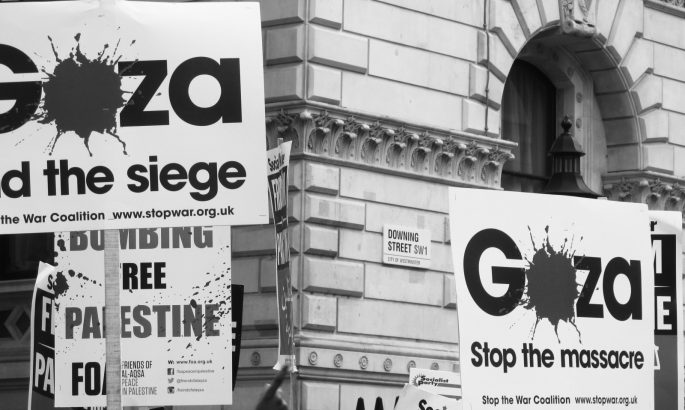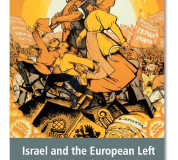The UK’s response to the recent Gaza conflict demonstrates, not for the first time, the role that domestic politics and public opinion can play in shaping British foreign policy in the Israeli-Palestinian arena.
With the next general election in sniffing distance, the political stakes are high for the political parties. Meanwhile the interaction of coalition politics and foreign policy – a novel experience for British politics – added a new layer of complexity to the policy making process.
When the conflict erupted, Prime Minister David Cameron followed the tone he set in his March speech to the Knesset, with a fulsome message of support for Israel. He reassured Israeli Prime Minister Benjamin Netanyahu of Britain’s ‘staunch support for Israel in the face of such attacks, and underlined Israel’s right to defend itself from them.’
Cameron defended Israel’s right to self-defence throughout the conflict, resisting calls to condemn Israel’s actions as ‘disproportionate’ or to suspend arms exports. Meanwhile Philip Hammond, who assumed the role of Foreign Secretary during the first week of the conflict, welcomed Israel’s acceptance of the 15 July ceasefire, and dismissed the UN Human Rights Council 23 July resolution condemning Israel and commissioning an inquiry as ‘fundamentally unbalanced’. During his visit to Israel in the last week of July, Hammond stressed that Hamas was to blame for the violence.
The media fuels bottom up politics
But with mounting public concern amidst intensive media coverage of civilian suffering in the Gaza Strip, the position of the Conservatives became increasingly strained.
The media’s coverage in the first week or two of the conflict, from the perspective of Israel’s supporters, was better than expected. Hamas’s increased capabilities, deploying rockets that brought all Israel’s major population centres in range, was noticed even by media outlets usually seen as hostile to Israel. Israeli voices and perspectives were widely heard.
A Guardian editorial on July 12, whilst raising pointed questions about Israeli targeting, stated: ‘Even the most shocking fact of the past week’s events – the asymmetry of the dead, which has seen more than 160 Palestinians killed, compared with no Israeli fatalities – can be understood to be chiefly a function of Israel’s superior defensive infrastructure: Hamas would kill scores of Israeli civilians if it could. It’s just that its missiles don’t get through, while Israel’s do.’
The tone of the BBC’s coverage apparently riled pro-Palestinian activists, who rallied outside its headquarters to complain about it. (Though Middle East Editor Jeremy Bowen’s claim that he had seen no use of human shields in Gaza had many scratching their heads.)
But from an Israeli public diplomacy perspective (as on many other counts), this war simply went on too long. As the conflict wore on and Palestinian casualties mounted, the images, descriptions, and statistics of suffering and destruction in Gaza dominated the coverage and the public perception of the conflict. This in turn impacted on the political and decision-making echelons.
Leading British correspondents decamped to the Gaza Strip, with Kim Sengupta of The Independent, David Blair of The Telegraph, and Peter Beaumont of The Guardian, leading the way with daily, harrowing accounts of the suffering of innocent Palestinians. The searing images of dead children, and fatalities in UN facilities were particularly significant.
A highly emotive and politically charged brand of reporting spilled into the broadcast media in the case of John Snow, Channel 4’s main news anchor. Snow abandoned all pretence at objectivity by sending himself on assignment to Gaza and then returning several days later to condemn Israel and make an impassioned plea on behalf of the Palestinian children.
The presence of foreign journalists in the Gaza Strip did not lead to an equally intense coverage of Hamas and its tactics, partly as a result of Hamas intimidation which was only later revealed by the Foreign Press Association.
With the conflict leading the news agenda for days on end, both pro-Israel and pro-Palestinian campaigns mobilised effectively. But the pro-Palestinian cause benefited both from the media coverage and from its overwhelming numerical advantage. Its solid base in the British Muslim community – ten times larger than the Jewish community – and among political activists on the left, was particularly significant in Labour and Liberal Democrat constituencies.
This was expressed through mass letter writing campaigns to MPs and a series of large demonstrations in central London and other cities, organised by Islamist, leftist and pro-Palestinian groups. According to one Foreign Office official, a small army of officials had to be mobilised to manage the mail bag.
The mobilisation of the pro-Palestinian (or anti-Israel) campaign also brought a surge of Boycott, Divestment, Sanctions (BDS) activism. This included demonstrations outside supermarkets stocking Israeli produce or even simply kosher produce. The conflict also prompted a boycott motion from the National Union of Students, and a resolution by the Trade Union Congress, calling on member organisations to affiliate with the pro-boycott Palestine Solidarity Campaign .The Tricycle Theatre earned itself particular notoriety by demanding the Jewish Film Festival, which it hosted, give up funding from the Israeli government. It later backed down, but the episode left a sour taste. The conflict also saw record levels of attack on Jews and Jewish property, in turn triggering a wave of media commentary warning of the rise of anti-Semitism. All of these developments, mediated with increasing intensity through social media, prompted a degree of alarm in the Jewish community.
Party politics kicks in
With letters pouring into MP’s offices, Labour and the Liberal Democrats appeared to be in a battle to outdo one another in their attacks on both Israel and Cameron. Nick Clegg set the benchmark, leaping on an opportunity to put distance between himself and his Conservative coalition partners by accusing Israel of ‘a deliberately disproportionate form of collective punishment.’
Apparently not wanting to be outdone, the Labour front bench sharply increased the tone of its criticism of Israel a few days into the ground invasion, which it opposed. At the beginning of August Labour leader Ed Miliband turned his fire directly on Cameron, saying that his ‘silence on the killing of hundreds of innocent Palestinian civilians caused by Israel’s military action will be inexplicable to people across Britain and internationally.’
The Conservatives largely held the line, but Cameron’s and Hammond’s expressions of support for Israel became increasingly qualified as the weeks wore on. After the start of the ground operation, Cameron’s defence of Israel’s actions in the Commons was tempered with qualification that Israel’s actions should be ‘proportionate’ and expressions of ‘concern about mounting civilian casualties.’
The increasing weight of correspondence was no doubt in Philip Hammond’s mind when he told the Sunday Telegraph at the beginning of August: ‘It’s a broad swathe of British public opinion that feels deeply, deeply disturbed by what it is seeing on its television screens coming out of Gaza … The British public has a strong sense that the situation of the civilian population in Gaza is simply intolerable and must be addressed – and we agree with them – There must be a humanitarian ceasefire that is without conditions. We have to get the killing to stop.’
The unity of the Conservative front bench ultimately broke when Foreign Office Minister Baroness Warsi resigned of on 5 August, branding UK policy on Gaza as ‘morally indefensible’. Though she appeared an isolated figure in the Conservative Party, and faced accusation of political opportunism, she got a wide hearing in the media, and fuelled the debate about an arms embargo by demanding that ‘arms exports to Israel must stop’.
Until that point the Conservatives had been resisting Liberal Democrat calls within the coalition to suspend arms exports. It was in the wake of Warsi’s resignation that Liberal Democrat Secretary of State for Business Vince Cable took the unprecedented step of hijacking foreign policy from the Foreign Office. He used his position as Minister for Trade to announce that the UK would suspend export licences to Israel in the event of a resumption of significant hostilities. Observers of Israeli politics are used to the sight of ministers from rival parties using their portfolios to promote their own foreign policy agenda. This was however, a novel sight in Britain.
The announcement itself left Britain, bizarrely, sending a message that if Palestinian armed groups resumed their firing, the UK would take action against Israel. Foreign Office officials insisted privately that, in reality, the circumstances of any breakdown in ceasefire would be considered. In the event when fighting did resume after a series of faltering ceasefires, no UK announcement of suspension came. The coalition infighting had created a position that was ultimately incoherent.
A long term shift in public opinion?
Where does this experience leave the British body politic with regard to Israel? It is certainly not the first time that conflict involving Israel has become a domestic political issue. The Labour opposition attacked the Conservatives over the Suez Crisis in 1956, and opposed Edward Heath’s refusal to resupply Israel during the 1973 Yom Kippur War. Tony Blair’s refusal to condemn Israel’s actions during the Second Lebanon War in 2006 contributed to his political isolation in his own party, helping to trigger a backbench revolt.
This is perhaps the first time the Conservative Party has found itself defending a relatively pro-Israel position in government, against attacks from both the centre-left parties. During the 1982 Lebanon War, by contrast, the Thatcher government did halt arms exports to Israel.
A series of polls by YouGov show the extent to which party support is an indicator of support for Israel or the Palestinians. A poll conducted in January 2014 showed that whilst a clear majority of voters for all major parties are neutral with respect to the conflict, a considerably higher proportion of Tory voters sympathised with Israel (28 per cent) than the Palestinians (15 per cent), in contrast with Labour voters whose sympathies were 31-13 in favour of the Palestinians, while Liberal Democrat voters whose sympathies were 33-9 in favour of the Palestinians. The relative positions the various party leaders took during the conflict should be seen in this context.
YouGov’s tracking data showed, at the height of the conflict, a significant climb in sympathy for the Palestinians across all the parties. By the beginning of August, a clear majority were still sitting on the fence, but sympathies with the Palestinians grew considerably across the board. As Israel’s military operation peaked in early August, there was a shift to 23-21 sympathising in favour of the Palestinians among Conservative voters, 41-7 among Labour voters and 40-7 among Liberal Democrats. Across the population as a whole, sympathy for the Palestinians reached 30 per cent, the highest since YouGov tracking began in 2003.
This by no means indicated support for Hamas. Indeed a poll on 20 July showed just 7 per cent though Hamas rocket fire was justified, compared to 15 per cent who thought Israel’s air operation were justified, and 22 per cent who thought Israeli ground operations justified.
Nonetheless, the conflict shifted some who were previously ambivalent, to take a position of sympathy with the Palestinians. It remains to be seen whether this was a short term reaction to the intense media focus on Palestinian civilian casualties, or whether the images of war have had a more lasting impact on British attitudes towards the conflict.





































